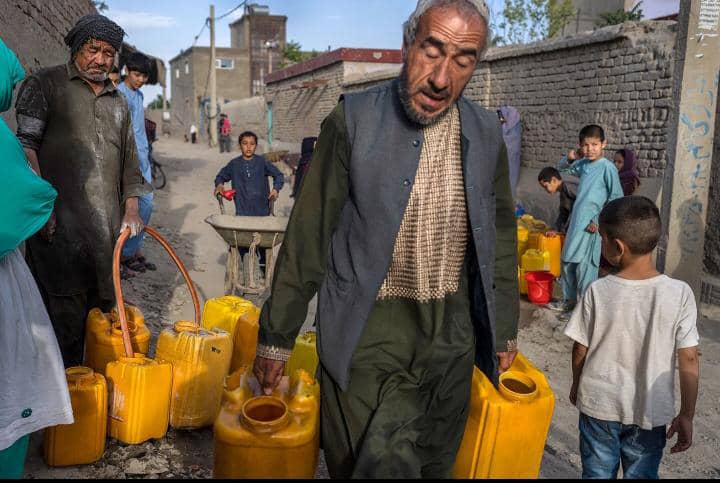A looming disaster threatens the heart of Afghanistan, as its capital city, Kabul, teeters on the edge of a historic water crisis.
Diaspora Digital Media (DDM) gathered that Kabul may soon become the first capital city in modern history to completely run out of water.
This dire prediction comes from a new report by international humanitarian group, Mercy Corps, which warns that the city’s dwindling water resources could spiral into full economic collapse.
At the center of this crisis is Raheela, a 42-year-old mother of four, who begins each day in a desperate search for water.
Each morning, the rumble of approaching water tankers sends her sprinting into the street, hoping to refill her family’s worn buckets and plastic jerrycans.
Raheela, who only uses one name, told CNN that her family has no access to clean drinking water.
They buy every drop they consume, a growing burden that forces them to sacrifice food and other necessities just to drink and bathe.
“Water shortage is a huge problem affecting our daily life,” she said.
According to experts, Kabul’s water crisis is the result of a dangerous combination of factors.
A booming population, unchecked over-extraction of groundwater, and the worsening effects of climate change have pushed the city to the brink.
Nearly half of all boreholes drilled to access underground water have already gone dry, leaving millions in a daily struggle for survival.
In neighborhoods like Raheela’s, the sight of water trucks sparks both hope and anxiety, as families scramble to collect their share.
The cost of water has skyrocketed, pushing many into debt or deeper poverty.
Every decision around the home now revolves around conserving water, with Raheela and others forced to make impossible choices.
“We hope for more rain, but if things get worse, I don’t know how we’ll survive,” she said.
Mercy Corps warns that without immediate international intervention, Kabul could face not just a humanitarian disaster, but also a breakdown of civil society.
Water insecurity has the potential to fuel unrest, displacement, and further conflict in a region already grappling with instability.
Afghanistan’s fragile government, crippled by sanctions and isolation, is ill-equipped to tackle the crisis alone.
Experts argue that urgent investment is needed in sustainable water infrastructure, rainwater harvesting, and groundwater recharge systems.
But with donor fatigue and geopolitical tensions rising, such aid has been slow to arrive.
Kabul’s story is now a stark warning to the world: no city, no matter how old or historic, is immune to the consequences of environmental mismanagement.
And unless swift action is taken, Kabul may be remembered not for its resilience, but as the first capital city to run out of water.
👇👇👇
Follow DDM’s official WhatsApp Channel for real-time updates.
https://whatsapp.com/channel/0029Vajkwdc4dTnFHl19vW3g







